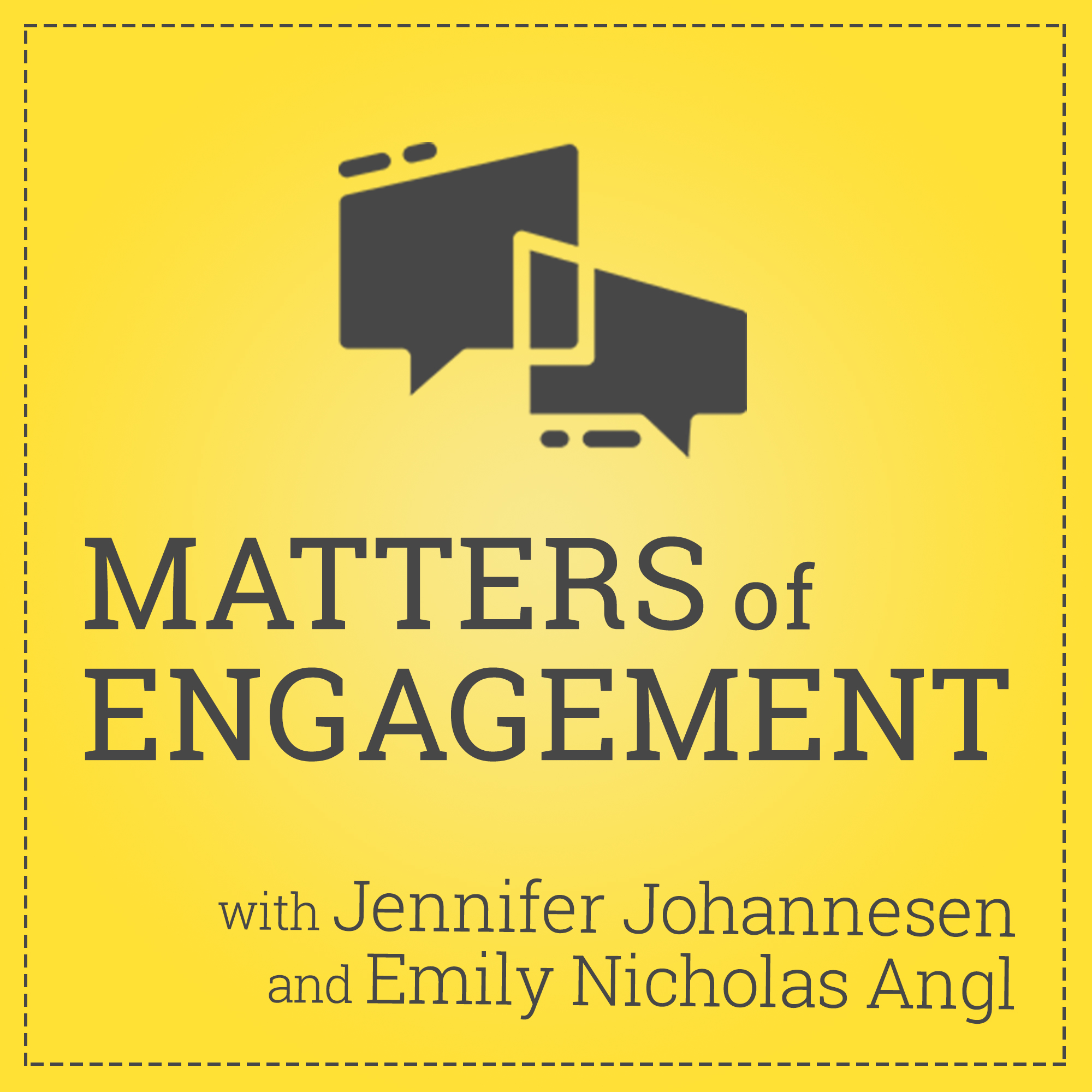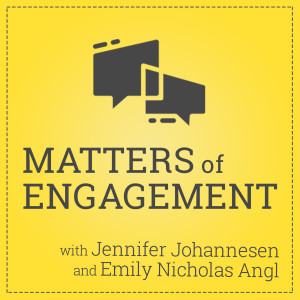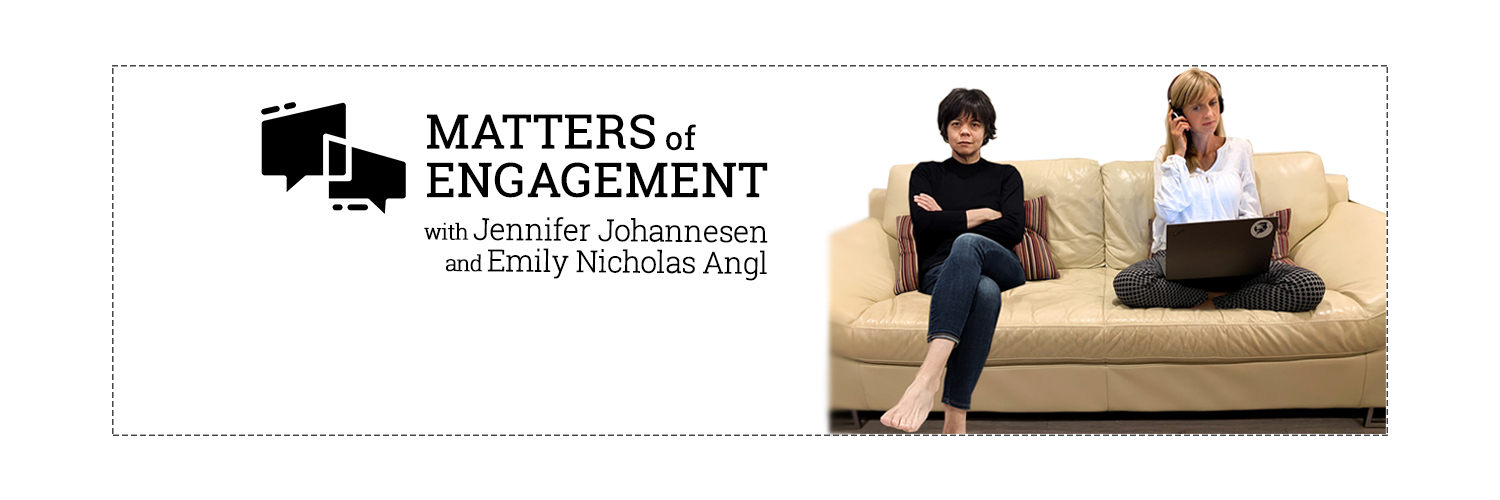
Matters of Engagement examines issues at the intersection of health, health care and society. Including: how people in Canada access and experience health care service delivery and distribution; how those experiences impact both individual and community health; and the multitude of environmental, systemic, and political factors that favour some and disadvantage many. Jennifer Johannesen and Emily Nicholas Angl produce each episode with the aim of illuminating difficult or confounding issues, to provoke much-needed critical dialogue among all stakeholders.
Episodes

Tuesday Oct 19, 2021
Patient-Oriented to Patient-Partnered: Aspirations, Implications, Challenges
Tuesday Oct 19, 2021
Tuesday Oct 19, 2021
In this first episode of Season 3, we go back to basics. What does "patient-oriented" (as in patient-oriented research) actually mean? To answer this and other questions, we're joined by Vasanthi Srinivasan, Executive Director of the Ontario SPOR SUPPORT Unit, and Maureen Smith, Chair of OSSU's Patient Partner Working Group and member of OSSU's Board of Directors. (OSSU is a generous financial supporter of this podcast.)
Vasanthi outlines the hopes and dreams of the patient-partnership movement, sharing the vision for a culture change and acknowledging that there's still a way to go. Maureen shares her perspective as a long-time patient partner, providing a frank account of the possibilities - and challenges - of partnering in research.
Join us for these two illuminating conversations in which we discuss the aspirations, implications and challenges in moving towards a "patient-partnered" future.
Guests:
Links to organizations mentioned in this episode:
- Ontario SPOR SUPPORT Unit
- Canadian Institutes of Health Research
- Strategy for Patient-Oriented Research
- US National Institutes of Health
References provided by Maureen Smith:

Thursday Mar 04, 2021
Thursday Mar 04, 2021
We're busy preparing for our next season. But in the meantime, we have a fun episode to share with you! It's the recording of the webinar we did in collaboration with our friends at PEP Talks and SPORcast, in January 2021. It was a live session called "Podcasts and Patient Engagement" and features Paul Fairie and Sandra Zelinsky of PEP Talks, Bev Pomeroy of SPORcast, and Jennifer Johannesen and Emily Nicholas Angl, hosts of Matters of Engagement. We each talk about our respective podcast projects, why and how we got started, ideas about sustainability, how we approach our topics and much more.

Sunday Jan 24, 2021
Sunday Jan 24, 2021
The Ontario Center of Excellence for Child and Youth Mental Health is an organization that supports the child and youth mental health sector through a number of initiatives and services. Their approach to developing and delivering that support is done in active collaboration with young people and their families. In healthcare spaces, we often see engagement practice as something separate, maybe adjacent, to everyday operations. But here, youth and family involvement is deeply embedded. Kelli Dilworth is a Knowledge Broker at the Center. She's responsible for supporting agencies and their engagement efforts, and implementing quality standards for youth and family engagement.
For this episode, we've put aside the ins and outs of Kelli's job per se, and instead wanted to share her reflections and insights about her role - the rewards and frustrations that come with both her official responsibilities and the personal obligations and commitments she feels to the young people that she works with. It really is a tightrope - and Kelli's honesty and openness help us get a better understanding.
Mentioned in this episode:
- Ontario Center of Excellence for Child and Youth Mental Health
- Ontario Center of Excellence for Child and Youth Mental Health on Twitter
Also, join Matters of Engagement, SPORcast and PEP Talks for a live collaboration event on February 2 for a session titled "Podcasting and Patient Engagment"! Details and registration here.

Tuesday Jan 12, 2021
Research Ethics Boards and Patient Partnership
Tuesday Jan 12, 2021
Tuesday Jan 12, 2021
Back in December 2020, Jennifer moderated a panel for Child-Bright titled "Roles and Relationships: Ethical Considerations Related to Involving Children and Parents in Patient-Oriented Research". Child-Bright and the panelists generously agreed to let us use 'tape' from that session to explore some of the themes we thought our listeners would find especially interesting. (The panelists are: Elizabeth Stephenson, Franco Carnevale, Gillian Backlin, Antonia Palmer, Thierry Lacaze-Masmonteil. Profiles below.)
In this episode, Jennifer and Emily pick up one of the discussion threads to consider whether there might be a role for Research Ethics Boards (REBs) in supporting meaningful patient partnership.
(The video recording of the original Zoom event is openly available. You can watch it here. In the session we covered so much more than we were able to address! It's not required in order to enjoy this episode, but we do encourage everyone to watch.)
Mentioned in this episode:
- Roles and Relationships: Ethical Considerations Related to Involving Children and Parents in Patient-Oriented Research
- Child-Bright Network
- Ethics Guidance for Developing Partnerships with Patients and Researchers
- The Canadian Collaboration for Child Health: Efficiency and Excellence in the Ethics Review of Research (CHEER)
- Tri-Council Policy Statement: Ethical Conduct for Research Involving Humans – TCPS 2 (2018)
Reading that challenges common understandings about the role of REBs:
- The Ethics Rupture: Exploring Alternatives to Formal Research-Ethics Review
- How did we ever get into this Mess? The Rise of Ethical Regulation in the Social Sciences
- Regulating Creativity: Research and Survival in the IRB Iron Cage
- Against Research Ethics Committees
- "We need more critical thinking in clinical bioethics if patient autonomy is what we seek"
Panelist Profiles:
- Elizabeth Stephenson is a Professor of Pediatrics at the University of Toronto and the Section Head of Cardiac Electrophysiology at The Hospital for Sick Children. Her research focus on electrophysiology has led to clinical investigations in cardiac resynchronization- and implantable defibrillator therapies. Additionally, she serves as the Chair of the SickKids’ Research Ethics Board.
- Franco Carnevale is a nurse, psychologist and clinical ethicist with research interests in pediatric ethics. In addition to a number of academic appointments at McGill, he is the founder and principal investigator for VOICE (Views On Interdisciplinary Childhood Ethics) to advance knowledge and practices relating to ethical concerns in childhood.
- Gillian Backlin is a technical writer, an active member of CHILD-BRIGHT’s National Youth Advisory Panel, and a Patient and Family Ambassador Liaison at the BC Children’s Hospital’s Sunny Hill Health Centre.
- Antonia Palmer is actively involved in the realm of pediatric oncology. In addition to being the co-founder of the Advocacy for Canadian Childhood Oncology Research Network, she founded Neuroblastoma Canada, and is a board member for Childhood Cancer Canada. She also chairs the Patient and Family Advisory Committee of the CHEER (Canadian Collaboration for Child Health: Efficiency and Excellence in the Ethics Review of Research) initiative which aims to streamline and improve the research ethics review process to enhance and expedite child health research across Canada.
- Thierry Lacaze-Masmonteil is child health and wellness researcher. He is a Professor of Pediatrics at the university of Calgary and is the section head of Neonatology at the Cumming School of Medicine. Additionally, he serves as the scientific director of MICYRN - the Maternal Infant Child Youth Research Network and is a co-principal investigator on the aforementioned CHEER initiative.

Thursday Dec 17, 2020
Thursday Dec 17, 2020
We have a special mini-series we’re releasing this week: Engaging in Storytelling: A 3-part collaborative podcast series with SPOR Cast, Matters of Engagement and PEP Talks. We each cover a different angle on patient stories and storytelling – together they provide a rich picture of some of the challenges, concerns, and also opportunities when it comes to engaging in storytelling. We will be sharing all three episodes on our platforms.
This is the last of 3, and it’s produced by PEP Talks! Creating Spaces for Storytellers
Guest: Amy Hill, Silence Speaks Director, Story Center US
"In this episode of PEP Talks, Amy Hill from the Story Center US talks a little bit about the history, methodology, impact and provides some examples of Digital Story Telling in the context of public health and health research."
Mentioned in this episode:

Wednesday Dec 16, 2020
Wednesday Dec 16, 2020
We have a special mini-series we’re releasing this week: Engaging in Storytelling: A 3-part collaborative podcast series with SPOR Cast, Matters of Engagement and PEP Talks. We each cover a different angle on patient stories and storytelling – together they provide a rich picture of some of the challenges, concerns, and also opportunities when it comes to engaging in storytelling. We will be sharing all three episodes on our platforms.
This is the 2nd of 3, and it’s produced by us! Organizations and Patient Stories
Our guests are Carol Fancott (Director of Patient Partnerships and Engagement at the newly amalgamated organization that's brought together the Canadian Foundation for Healthcare Improvement and Canadian Patient Safety Institute) and Daniel Z. Buchman (Bioethicist and Independent Scientist at the Center for Addiction and Mental Health, Assistant Professor at the Dalla Lana School of Public Health at the University of Toronto, and member of the University of Toronto Joint Center for Bioethics).
Carol shares her thoughts on patient stories and storytelling based on the subject of her PhD, which is: how organizations use patient stories for learning. We talk about ‘spectating’, control and power, using dialogue to enhance learning, and how stories are just one input of many when it comes to understanding patient experience. Dan then helps us think through some of the moral and ethical implications about what organizations are asking of patients when it comes to telling their story.
Mentioned in this episode:
- Kumagai, Arno K., MD A Conceptual Framework for the Use of Illness Narratives in Medical Education, Academic Medicine: July 2008 - Volume 83 - Issue 7 - p 653-658 doi: 10.1097/ACM.0b013e3181782e17
- Kumagai, Arno K. MD; Naidu, Thirusha PhD Reflection, Dialogue, and the Possibilities of Space, Academic Medicine: March 2015 - Volume 90 - Issue 3 - p 283-288 doi: 10.1097/ACM.0000000000000582
Daniel Z. Buchman on twitter
SPORcast on twitter
PEP Talks on twitter

Tuesday Dec 15, 2020
Tuesday Dec 15, 2020
We have a special mini-series we’re releasing this week: Engaging in Storytelling: A 3-part collaborative podcast series with SPOR Cast, Matters of Engagement and PEP Talks. We each cover a different angle on patient stories and storytelling - together they provide a rich picture of some of the challenges, concerns, and also opportunities when it comes to engaging in storytelling. We will be sharing all three episodes on our platforms.
This is the first of 3, and it’s produced by our friends at SPORCast: The Patient Story Experience: Cost or Benefit?
In this episode, Bev hosts a conversation between an activated Patient Partner and a Trauma Informed Practice expert on patient storytelling; which is quite often the entry point of patient engagement in healthcare. We hope you enjoy it! If you’re listening in order, The Matters of Engagement episode is up next (Wednesday), followed by PEPTalks (Thursday).

Sunday Nov 22, 2020
Sunday Nov 22, 2020
This is a conversation we've been sitting with for many weeks, thinking hard about how to present it. We spoke to our guests with the idea we would simply talk about the paper they co-authored... and we did... but we also ventured into spaces we didn't anticipate! Although they are not from the patient engagement world, Amy and Melody's research and insights cast a different sort of light on engagement activities. Hosts Jennifer and Emily think through ideas of power, obfuscation, accountability, and whether we're all just spinning our wheels...by design.
Mentioned in this episode:

Sunday Nov 08, 2020
Patient Experience as Evidence, with Miles Sibley
Sunday Nov 08, 2020
Sunday Nov 08, 2020
The Patient Experience Library is a UK-based online archive of research and reports focused on patient experience. They just published a report titled "Inadmissible Evidence" which outlines, in direct and accessible terms, why they think patient experience evidence is not valued alongside medical evidence. Their answer? It's healthcare's culture of minimizing patient accounts, complaints, and reports... essentially, a discounting of patient voice that is pervasive throughout healthcare and which they link directly to avoidable harm to patients. They point to a double standard which takes medical research seriously, while dismissing the experiences of patients as "anecdotal".
Jennifer and Emily speak with Miles Sibley of the Library, and connect the Library's overall mission with one of the goals of "patient engagement" here in Canada - to amplify the patient voice - and patient experience - and to have it taken seriously by medicine and healthcare.
Mentioned in this episode:
- The Patient Experience Library
- Report download: Inadmissible Evidence
- Independent Medicines and Medical Devices Safety Review (referred to in our episode as "the Cumberlege report")
- GRIPP2 reporting checklists: tools to improve reporting of patient and public involvement in research

Sunday Nov 01, 2020
Hosts Jennifer and Emily learn to "let go of perfection"
Sunday Nov 01, 2020
Sunday Nov 01, 2020
It'll be another week or so until we release our next scheduled episode. So we thought this would be a perfect opportunity to give listeners a bit of insight into how we approach making this podcast! This is our unscripted (but lightly edited) conversation about everything from interviewing guests to how we think about scripting and editing to why we love working together on this podcast.
